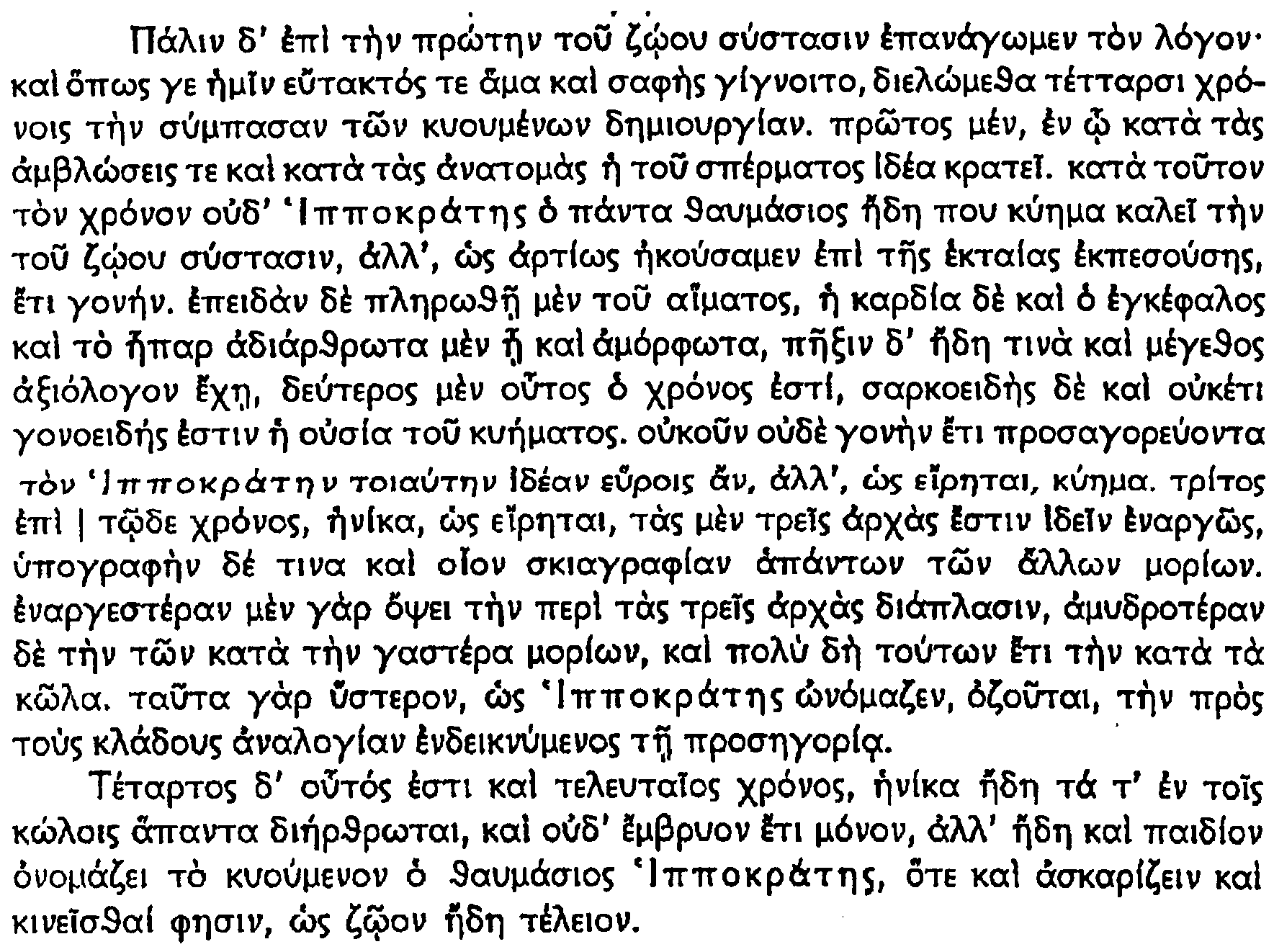
Responses are welcome at lactantius@hotmail.com
Last Updated: 8 July 1999
We are glad to have the opportunity to address the points brought up in critical discussion of the research first published in 1996, "Embryology in the Qur'an", demonstrating the very clear link between the writings of ancient Greek physicians (most notably Galen) and the embryological development described in the Qur'an. A response to this paper has recently been published. Here we analyse that response.
According to the missionary, the Qur'an plagiarises ancient Greek Literature, and as a result, it should be rejected as a divinely revealed or inspired scripture. This short paper proposes to examine the Christian charge of plagiarism, and using their own methodology apply their argument to the Bible.
For the record, Lucius Caecilius Firmianus Lactantius is the name of a fourth-century apologist and defender of the Christan faith. You may read more about this illustrious predecessor by following the link above.
Proof Demanded
Yet the missionary provides no evidence, no proof whatsoever to substantiate this claim of plagiarism. The missionary cites neither the original Greek text of Galen nor the Arabic of the Qur'ân; nor does he provide a sufficiently thorough analysis of the two accounts in order to substantiate his claim.
That is a simple fault to rectify. The author had not anticipated that the majority of the audience of the original paper would be fluent either in Arabic or Greek. However, for the benefit of those readers who are, we now include the original text in Greek in which Galen describes the four stages of the Qur'an. I follow it with sura 22:5 in Arabic. Note the similarity; Galen wrote about four hundred years before Muhammed.

English translation:
The fourth and final period is at the stage when all the parts in the limbs have been differentiated; and at this part Hippocrates the marvelous no longer calls the foetus an embryo only, but already a child, too when he says that it jerks and moves as an animal now fully formed (Arabic `a new creation')."[1]
The Qur'an, sura 23 verses 13-14:

English translation:
The first stage of Galen corresponds to [nutfah], the drop of semen; the second stage, a bloody vascularised embryo with unshaped brain, liver and heart ("when it has been filled with blood") corresponds to [alaqa], the blood clot; the third stage "has the form of flesh" and corresponds to [mudghah], the morsel of chewed flesh. The fourth and final stage was when all the organs were well formed, joints were freely moveable, and the foetus began to move. If the reader is in any doubt about the clear link being described here between the Galenic and the Qur'anic stages, it may be pointed out that it was early Muslim doctors, including Ibn-Qayyim, who first spotted the similarity. Basim Musallam, as Director of the Centre for Middle eastern Studies in Cambridge, U.K. concludes:
Our critic continues:
Given the close similarity between Galen's stages and the rather less detailed description of development in suras 22:5 and 23:13-14, it is particularly significant that some 26 books of Galen's work were translated into Syriac as early as the sixth century AD by Sergios of Resh' Aina (Ra's al-Ain).[3] Sergios was a Christian priest who studied medicine in Alexandria and worked in Mesopotania, dying in Constantinople in about AD 532. He was one of a number of Nestorian (Syriac) Christians who translated the Greek medical corpus into Syriac. The Nestorians experienced persecution from the mainstream church and fled to Persia, where they brought their completed translations of the Greek physicians' works and founded many schools of learning. The most famous of these by far was the great medical school of Jundishapur in what is now south-east Iran, founded in AD 555 by Anusharwan.
The major link between Islamic and Greek medicine must be sought in late Sasanian medicine, especially in the School of Jundishapur rather than that of Alexandria. At the time of the rise of Islam Jundishapur was at its prime. It was the most important medical centre of its time, combining the Greek, Indian and Iranian medical traditions in a cosmopolitan atmosphere which prepared the ground for Islamic medicine. The combining of different schools of medicine foreshadowed the synthesis that was to be achieved in later Islamic medicine.[4]
According to Muslim medical historians, including ibn Abi Usaybia and al-Qifti, the most celebrated early graduate of Jundishapur was a doctor named al Harith ibn Kalada.[5] Faced with the collection of Syriac manuscripts of Greek physicians which had recently been introduced to Jundishapur, it is inconceivable that he would not have been aware of Galen's theories. Furthermore, al Harith was an older contemporary of Muhammed and became one of the Companions of the Prophet. We are told by Muslim historians that Muhammed actually sought medical advice from him[6], and his "teachings undoubtedly influenced the latter" [i.e., Muhammed].[7] Cyril Elgood writes:
One further point should be made here. According to Muslim traditions part of at least one of the verses in the Qur'an relating to the developing human came originally from human lips. While Muhammed was dictating verse 23:14 to `Abdullah ibn Abi Sarh, the latter got carried away by the beauty of what he heard about the creation of man, and when Muhammed reached the words "another creature" his companion uttered the exclamation "Blessed be God, the best of creators!" Muhammed accepted these words as though they were the continuation of his revelation and told ibn Abi Sarh to write them down, even though they were quite clearly his companion's words, not Muhammed's or Allah's words.[9] Since we know that some of the words in this aya came from one of Muhammed's companions, what is there to stop us believing that other words in this passage came from another of his companions, namely al Harith, who was summarising Galen's theory of embryological development?
From the evidence cited above a number of things become clear.
The above should more than suffice to justify my accusation that the Qur'an plagiarises ancient Greek science.
Does the Bible Plagiarise Ancient Greek Literature?
So, what does the Bible say concerning Embryology? In this section we cite embryological references to be found in Bible using the same source as used by the missionary, A History of Embryology by Joseph Needham.
This comparison of embryogeny with the making of cheese is interesting in view of the fact that precisely the same comparison occurs in Aristotle's book On the Generation of Animals, as we have already seen."[10]
However, what is overlooked is the fact that the book of Job was most probably written long before Aristotle, using the common themes of creation from clay, the dust of the earth; and curdling like cheese. The Hebrew in Job is difficult to translate - indeed, the Septuagint [Greek translation] of Job omits certain lines which presumably they did not fully understand. The word for "curdling like cheese" is a case in point, found nowhere else in the Bible and being an ancient Hebrew construct.
Needham concludes that both references in the Bible can be traced back to Aristotle and even Hippocrates:
The Wisdom of Solomon is part of the Apocrypha, and consequently was considered canonical neither by the Jews, nor the early Christians. It is still not regarded as canonical by Protestant Christians. Jesus and the authors of the New Testament quote the Old Testament extensively, but not once do they mention any book from the Apocrypha (1 Enoch 1:8 and 60:8, cited by Jude is not part of the Catholic Apocrypha, and he uses the passage in Jude 14-15 for illustration rather than for proof of doctrine). Jerome, the Catholic translator of the Bible into Latin (the Vulgate translation) included them but described them as "books of the church", helpful for believers but not "books of the Canon". The earliest Christian list of Old Testament books, written by Melito, Bishop of Sardis in 170 A.D. mentions every Old Testament book except Esther, but fails to mention anything from the Apocrypha.
Since it was not until the Council of Trent in 1546 A.D. that the Catholic Church officially declared the Apocrypha to be part of the Canon of Scripture, it seems unnecessary to defend the inclusion of Hippocratic theories in a book which is not generally recognised to have been part of the Biblical Canon for most of the history of Christianity.[12]
Conclusions
As discussed above, the verse from Job is likely to have been written before Aristotle, so perhaps we should ask whether the Bible inspired Aristotle rather than the other way round.
The Qur'an claims that its words are the very words of Allah (c.f. sura 1:2 "This is the Book [the Qur'an], whereof there is no doubt...", or sura 17:105 "With truth We have sent it [the Qur'an] down") If we can demonstrate that a sura, or even a verse has been copied from elsewhere the claim to be God's inspired Word collapses. We have, indeed fulfilled the Qur'anic challenge to "bring a sura like it" (sura 2:23).
By all means charge the author of Wisdom with plagiarising Aristotle, since the Jews and early Christians never considered the words of Wisdom to be equal in authority to the Old and New Testament.
Because the circumstantial evidence for Muhammed introducing the ideas of Galen into the Qur'an is overwhelming, as discussed earlier.
Because neither Jews nor the early Christians (including Melito and Jerome), nor modern Protestants accept the Wisdom of Solomon to be divinely inspired, as was made quite clear earlier.
References
Responses to Islamic Awareness
Answering Islam Home Page